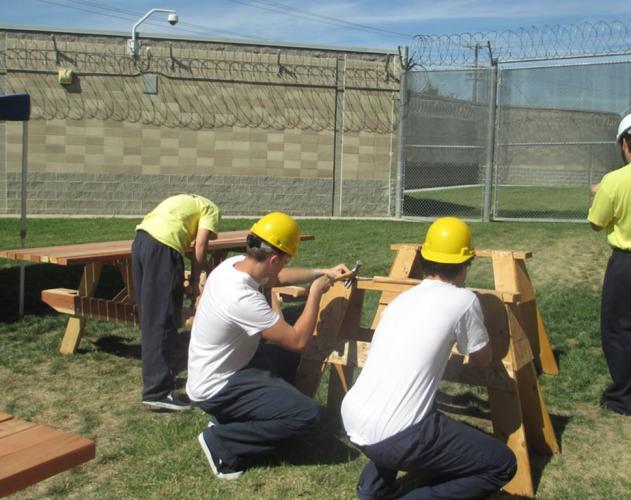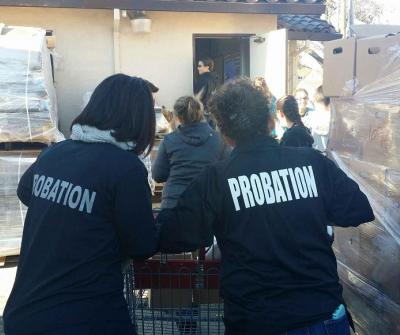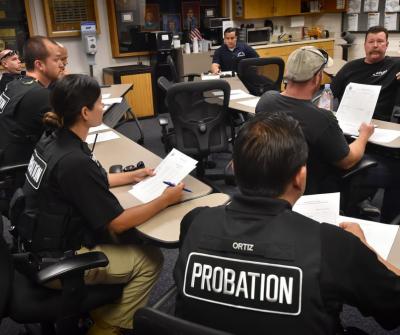Home
Some Highlights of Our Breakout Sessions and One of Our General Sessions!
Day 1 of our conference will feature a general session by the California Department of Social Services (CDSS) covering California’s new Permanent Foster Care Rate Structure. Starting July 2025, a key part of this rate structure will take effect, requiring the use of standardized high-fidelity Child and Adolescent Needs and Strengths (CANS) assessment for all youth and non-minor dependents (NMDs) in foster care. This important CANS update will be explored in depth during a breakout session later that day.
Spotlight
Lake County Probation’s 4th Annual Resilient Re-Entry Event Aimed at Overcoming Odds
From Lake County Record Bee and CPOC Communications team.
At Lake County Probation, they believe in second chances and the power of resilience while providing both supervision and services to those in their custody. This commitment was on full display at the 4th Annual Resilient Re-Entry Event, hosted in partnership with the Lake County Campus of Woodland Community College.
The event served as a reminder that re-entry is more than just a process—it’s a journey of resilience, perseverance, and longterm community support and safety. Attendees had the opportunity to hear firsthand success stories from those who have overcome challenges and worked toward a better future.
Lake County Probation Chief Probation Officer Wendy Mondfrans said,
“This year’s Resilient Reentry was a fantastic event! Throughout the day individuals inspired those in attendance with their incredible stories of resilience, transformation, and impact. The message was clear that with a desire to change, this community is ready to help people make a difference in their lives. We are thankful for the team that helped put the event together and look forward to more successful events in the future.”
County Spotlight: Yuba County Probation’s F.O.R. Families Graduation
YUBA COUNTY, Calif., — On March 14, 2025, Yuba County Probation celebrated the achievements of participants in the F.O.R. Families program at a graduation ceremony held at the TEAM Center in Marysville. Eleven individuals completed the outpatient substance-abuse treatment program, and six people also earned their high school diplomas in partnership with the Yuba County Office of Education.
County Spotlight: Stanislaus County Probation Success Story – When Support and Accountability Meet
Sacramento, Calif., July 7, 2025 – For Juan, the journey through Stanislaus County Probation has been more than a chance to follow rules — it’s been an opportunity to rebuild his future, step by step, with accountability, guidance, support, and hope.
ICYMI: Experts Sound the Alarm on Prop. 36 Funding Gaps in Davis Vanguard Op-Ed
From Davis Vanguard
Sacramento, Calif., June 10, 2025 — In an opinion editorial published today, Davis Vanguard Editor and Founder David Greenwald highlights growing concerns about the recently announced legislative budget agreement and its failure to adequately fund implementation of Proposition 36, despite overwhelming voter support last November.
In the piece, Greenwald outlines concerns from across the spectrum – including from California Probation and state legislators – about the funding shortfall counties will face as they are expected to carry out the law’s provisions.
New Mural Brings Color and Healing to Monterey County Probation Department Juvenile Hall Garden
Monterey County, Calif., June 3, 2025 – A new mural within the garden of the Monterey County Juvenile Hall was unveiled Friday, May 30th at the Juvenile Hall facility, located at 1420 Natividad Road, Salinas. The mural is a creation of the young men in the facility and artist Fabian Debora of Homeboy Art Academy, a Los Angeles nonprofit that helps youth find identity and understand their roots through art. This special initiative marks Debora’s second visit to the Monterey County Juvenile Hall.
Victim Resources
CA Department of Justice Victims’ Services Unit – The Victims’ Services Unit offers crime victims and their families support and information at every stage of the criminal process.
CA Dept. of Corrections and Rehabilitation, OVSRS – Provides information on offender release, restitution, parole conditions and parole hearings when the offender is incarcerated in prison. 1-877-256-6877
Latest News See all news
Sandra Mendez Named New Santa Cruz County Probation Chief
From Santa Cruz Sentinel.
SANTA CRUZ, Calif. — December 31, 2025 — …Santa Cruz County has found the next leader of its Probation Department.
The county announced Monday that Sandra Mendez, a law enforcement professional with more than two decades of experience, had been selected as the new chief of probation. Her first day on the job will be Feb. 2.
“Sandra brings the right combination of experience, integrity, and vision,” said county Executive Officer Nicole Coburn in the release. “Her background positions her well to lead the department into its next chapter while maintaining a strong focus on public safety, rehabilitation, and staff support.”
County of Santa Barbara Probation Department Launches Countywide Holiday Juvenile Wellness Operation
From the Santa Barbara County.
SANTA BARBARA, Calif. – December 25, 2025 – On December 15, 18, and 19, 2025, the County of Santa Barbara Probation Department conducted countywide wellness checks of youth under its supervision to ensure the safety and wellbeing of both the youth and their families….
“Our Holiday Wellness Operation provide an opportunity to support the youth we supervise and their families throughout the County,” said Chief Probation Officer Holly Benton. “These wellness checks reinforce our ongoing efforts to connect families with the resources they need to thrive while promoting stability and overall success,” she said.

















